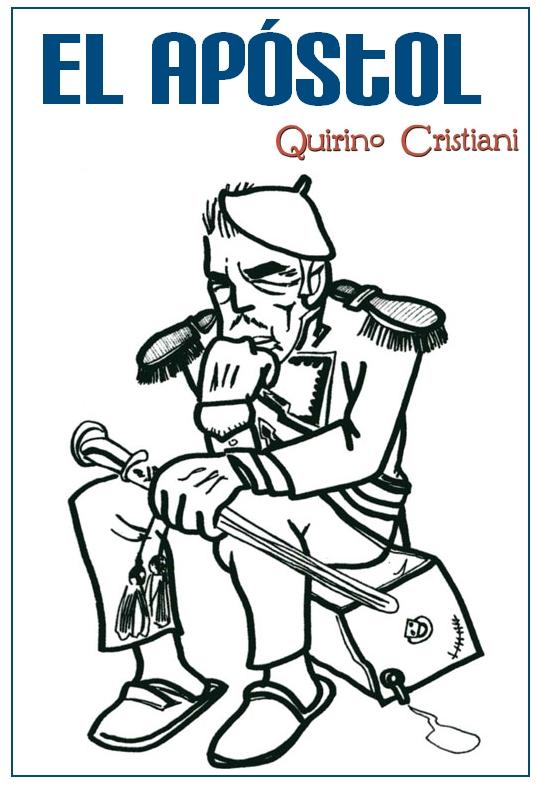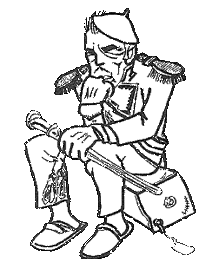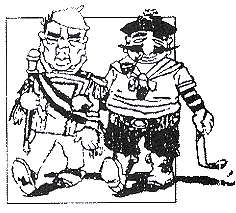El Apóstol (lost Argentinian first feature animated film; 1917): Difference between revisions
No edit summary |
|||
| Line 1: | Line 1: | ||
{{InfoboxLost | {{InfoboxLost | ||
|title=<center>El | |title=<center>El Apóstol</center> | ||
|image=El apostol-poster.jpg | |image=El apostol-poster.jpg | ||
|imagecaption=A fan-made poster for the film. | |imagecaption=A fan-made poster for the film. | ||
| Line 6: | Line 6: | ||
}} | }} | ||
'''''El | '''''El Apóstol''''' (aka ''The Apostle'') was an Argentinian silent black-and-white animated film released in 1917.<ref>[http://www.awn.com/mag/issue1.4/articles/bendazzi1.4.html Page about Quirino Cristiani (also source of pictures)] Retrieved 18 Mar '16.</ref> It was directed, written, designed and animated by Quirino Cristiani, whose two other animated features are also lost (''[[Sin_Dejar_Rastros_(Lost_Argentinian_Animated_Film;_1918)|Sin Dejar rastros]]'' and ''[[Peludopolis_(lost_animated_film;_1931)|Peludópolis]]''). | ||
It is considered to be the first animated feature (being 70 minutes long with a frame-rate of 14 images per second), but all known copies were destroyed in a fire in 1926. | It is considered to be the first animated feature (being 70 minutes long with a frame-rate of 14 images per second), but all known copies were destroyed in a fire in 1926. | ||
==Design== | |||
Instead of using traditional cellulose animation, Cristiani would use flat puppets with rotating/removable members. Character designs were made by Diógenes Taborda, a popular cartoonist at the time. | |||
==Premise== | |||
The film was a political satire about then-Argentinian-president Hipolito Yrigoyen, wanting to cleanse Bueno Aires of immorality and corruption. Yrigoyen flies into heaven and encounters the god of thunder, Jupiter. Using his lightning bolts, Yrigoyen strikes Bueno Aires, and the city is engulfed in flames, burning into ashes, before he decides to start rebuilding the city. He then awakens, finding out that this was all a dream and is forced to face the harsh reality of complicated politics. | The film was a political satire about then-Argentinian-president Hipolito Yrigoyen, wanting to cleanse Bueno Aires of immorality and corruption. Yrigoyen flies into heaven and encounters the god of thunder, Jupiter. Using his lightning bolts, Yrigoyen strikes Bueno Aires, and the city is engulfed in flames, burning into ashes, before he decides to start rebuilding the city. He then awakens, finding out that this was all a dream and is forced to face the harsh reality of complicated politics. | ||
No stills or posters of the film remain, apart from a few character designs by Taborda and a photograph of the Buenos Aires model, as seen below. Cristiani would later make another political satire animated feature about Yrigoyen: [[Peludopolis (lost animated film; 1931)|''Peludopolis'']]. | ==Legacy== | ||
No stills or posters of the film remain, apart from a few character designs by Taborda and a photograph of the Buenos Aires model, as seen below. | |||
Cristiani would later make another political satire animated feature about Yrigoyen: [[Peludopolis (lost animated film; 1931)|''Peludopolis'']]. | |||
==Gallery== | ==Gallery== | ||
Revision as of 07:43, 15 January 2017
El Apóstol (aka The Apostle) was an Argentinian silent black-and-white animated film released in 1917.[1] It was directed, written, designed and animated by Quirino Cristiani, whose two other animated features are also lost (Sin Dejar rastros and Peludópolis).
It is considered to be the first animated feature (being 70 minutes long with a frame-rate of 14 images per second), but all known copies were destroyed in a fire in 1926.
Design
Instead of using traditional cellulose animation, Cristiani would use flat puppets with rotating/removable members. Character designs were made by Diógenes Taborda, a popular cartoonist at the time.
Premise
The film was a political satire about then-Argentinian-president Hipolito Yrigoyen, wanting to cleanse Bueno Aires of immorality and corruption. Yrigoyen flies into heaven and encounters the god of thunder, Jupiter. Using his lightning bolts, Yrigoyen strikes Bueno Aires, and the city is engulfed in flames, burning into ashes, before he decides to start rebuilding the city. He then awakens, finding out that this was all a dream and is forced to face the harsh reality of complicated politics.
Legacy
No stills or posters of the film remain, apart from a few character designs by Taborda and a photograph of the Buenos Aires model, as seen below.
Cristiani would later make another political satire animated feature about Yrigoyen: Peludopolis.
Gallery
References
- ↑ Page about Quirino Cristiani (also source of pictures) Retrieved 18 Mar '16.



